Tutorial
Introduction
Librojuegos dispone de dos tipos distintos de libros para crear: los Cuentos y las Aventuras. Los Cuentos tienen un esquema del estilo "Elige tu propia aventura", mientras que las Aventuras combinan el estilo de "Elige tu propia aventura" junto con los juegos de rol RPG (Rol Playing Game). Los juegos RPG, básicamente, tienes un personaje con unas características, habilidades, armas, objetos, etc. que va evolucionando en función de las decisiones que tomes durante el juego.
Create Stories
In order to create a story you must register on the platform first. You will see that on the top right you can start the registration process.
Once registered you will be redirected to your user area where you will see the list of books you have read, and the list of books that you have created.
If you click on New Story, you will start to create a story. You must write a title, a summary of the book, select the language, the category of the book, and the image of the cover. These parameters can be modified in the future, so do not worry too much about it.
The story you are about to write should be divided into chapters. In each chapter there are several pages. There are also the links that link the different pages together. Each of the links is one of the decision options that the reader takes. Each chapter has a Start page (or entry) and other Final (or exit) pages. In addition, you can have pages of Death, which is when the reader has chosen the wrong path that ends in disaster.
Once you have created the story you will be able to edit it too and to add chapters. Once you have created a chapter (with its title and summary), you will see that you can edit the content of the chapters.
On the landing page you should be able to see a page like the following
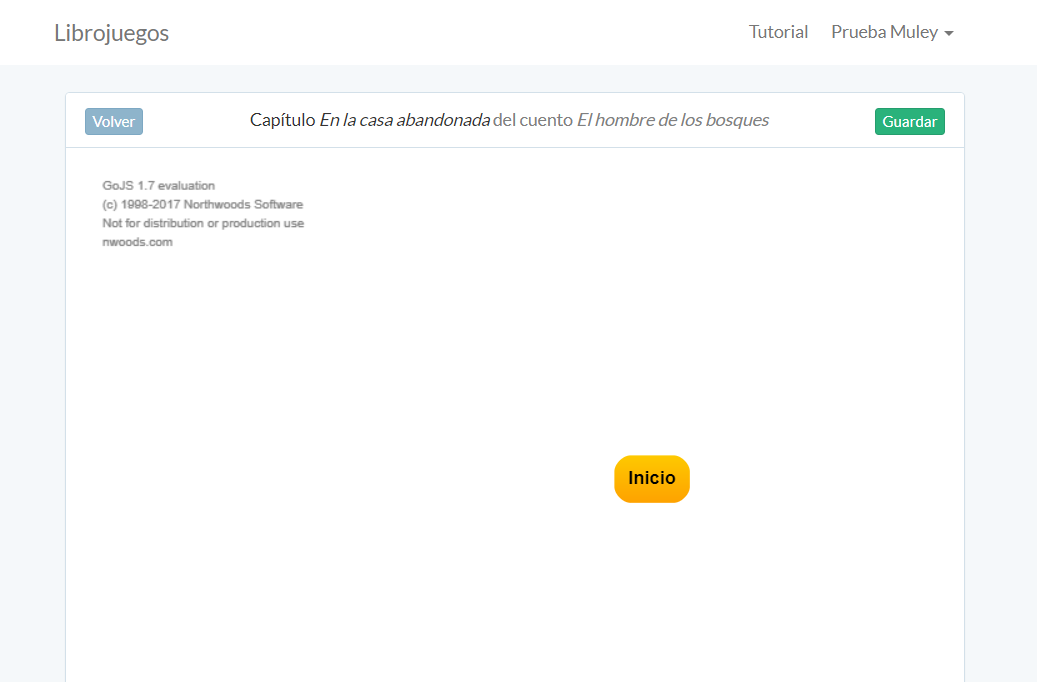
You have the Story editing screen in front of you. You see that you have a node in front of you. The nodes are pages. If you click on the text once, you will see that you can edit the title of the page. This title will show you which part of the story you are in. If you double click on the node you will see that a modal window shows up where you can edit this page of the story. You can edit texts with different fonts, colors, or upload images. In addition, below you have a selectable that allows you to indicate if this page is a page of Death, if from them you can go to other Chapters, or if it is the happy ending of the book.
In addition to the nodes you also have the links. If you click on a node you will see that a + sign appears at the top right of the node. This allows you to create a link from this node to a new node. You can modify the link text by clicking on it. This will allow you to change the text of the link that redirects the users to another page of the story.
In continuation I will leave you some pictures from the thirst three chapters os the story “ Little Red Riding Hood”
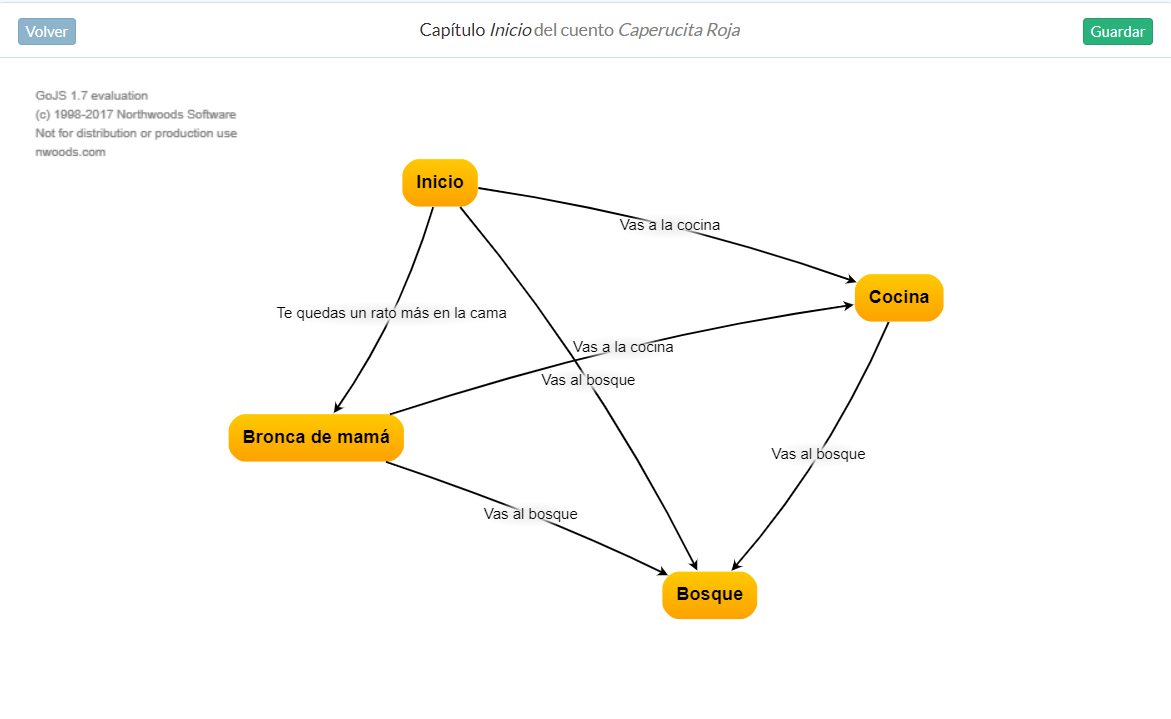
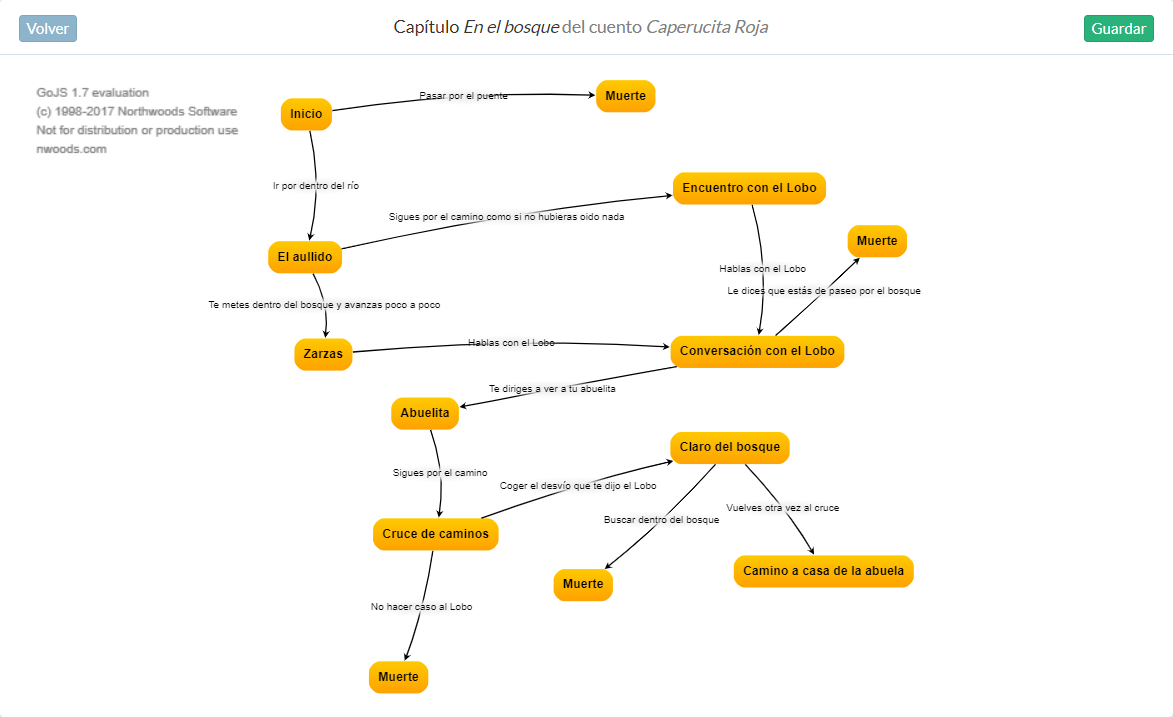
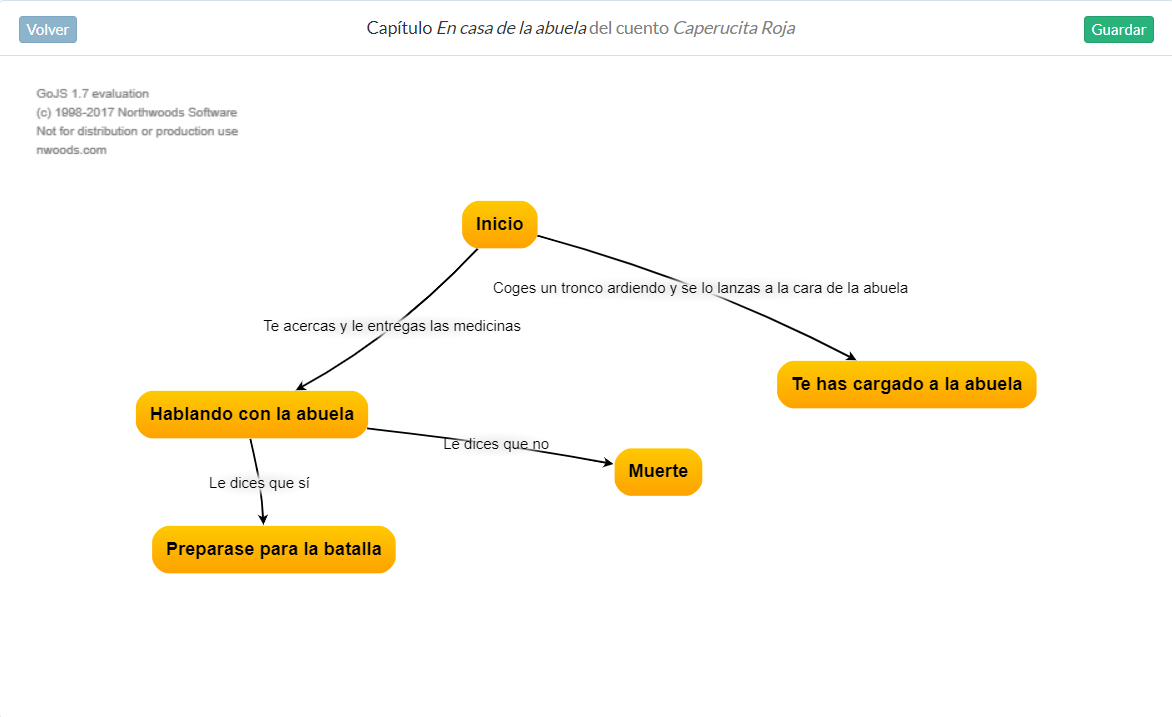
Create adventures
The adventures are basically the same as the Stories but with additional options to make the book a role play book.
The Character
When the reader starts reading your book, you will have the option to create a new character. The character has the following characteristics:
Character skills
Strength: This attribute measures muscle strength and is the value taken into account during the character's attack turn. The greater the strength, the more damage it will cause if the attack reaches the target.
Agility: This attribute measures the reflections and their value affects the defense turn.
Constitution: This attribute represents health and constitution. The number of life points of the character depends on this attribute.
Intelligence: This attribute indicates the character's ability to learn and perform magic.
Perception: This attribute allows you to detect hidden objects and perceive important details that might otherwise go unnoticed.
Charisma: Charisma is, among other things, the capacity of persuasion of the character. The larger it is, the better the buying and selling conditions that merchants will offer.
Character combat skills
Starting from the main characteristics you can obtain the ability to attack other characters and defend yours. In combat there are 4 parameters that determine your offensive and defensive ability. They are:
Attack: This parameter will be added to the result of the attack dice (10). It is calculated by dividing the strength by 2, and adding the additional points by having for example a weapon, or a magical object.
Defense: This parameter will be added to the result of the defense dice (10). It is calculated by dividing the agility by 2, and adding the additional points by having for example a shield, or a magical object.
Minimal and maximum damage: This attribute represents the damage you inflict on the opponent if you have succeeded hitting the opponent. The damage done less the absorption of the opponent, will give the number of points of life that you take away.
Absorption: m.Este atributo indica la capacidad de absorver golpes que tiene tu personaje. Se calcula sumando la absorción de armaduras, cascos, capas, etc. que tengas.
Life: If you run out of life points, you die. The maximum number of life points you can get is the result of multiplying your Constitution by 5, and adding the bonuses you have for having a talisman, or another object.
Mana: The mana points is the ability of your character to perform magic. The total mana that a user has available is the number of Intelligence points multiplied by 5.
Other parameters of the character
There are other parameters that define the character. They are the objects and events.
The objects are all weapons, potions, armors, etc. that the character has, and that make him more powerful.
When you read a book, by clicking the inventory button you can see the objects you have. You are allowed to select some of the objects such as weapons, armours and shields. When selected, the bonuses that those objects have will be transferred to your character. You cannot select more than one object from a specific category at a time. For example, you can not wear two armours, or two shields.Once you make a selection the object will have a blue shield which will allow you to easily see the objects that you have already selected.
There are other objects with bonuses that are selected immediately. They are not classified as one-handed weapons, two-handed weapons, defensive objects, bows, ... but simply as objects. They can be amulets, rings, pendants. Some of them have magical properties that increase your defense or attack. You can carry as many as you want at the same time.
The events are all those events that occur during the story and that can open (or close) access to pages of the story. For example, if X meets Y for the first time, on a subsequent page, a new plot could be opened.
Throughout the story, the character kills enemies, deciphers puzzles, etc. That makes them gain experience. By gaining experience, the character will improve their attack and defence capabilities, or their perception, intelligence and charisma. The reader decides how he wants his character to evolve and what kind of things he wants the character to do.
The character has money to buy other objects, etc. You can earn money by beating enemies, founding treasures, etc.
Create an adventure
If you want your story to be an adventure you must select the “ Adventure - Role Playing Game Book” option right when you start writing your story. This will enable new features. On the “Edit” page, you will see three buttons: Events, Monsters, and Objects.
The events have titles, and descriptions.
The objects
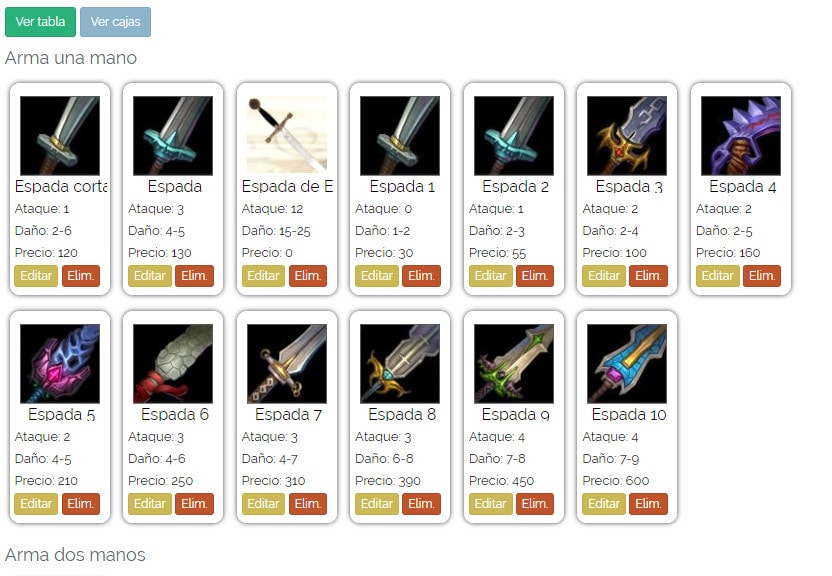
Objects have many parameters to configure:
- Type: can be weapons, defence items, potions, ... or a generic object. If you select a generic object you can edit everything.
- Name
- Description
- Maximum damage: if it's a weapon, the maximum number of life points you will lose (adding to the maximum damage you have done) if you reach your enemy
- Minimal damage: if it's a weapon, the minimum number of life points you will lose (adding to the minimum damage you have done ) if you reach your enemy
- Defense: the increase in defense. Typical for shields.
- Absorption: points of life that absorbs, for example an armour, when you get hit.
- Life: number of life points that will be added to the maximum number of life points you can have.
- Sum life: for the potions. They are the points of life that you recover when you take the potion.
- Attack: the increase in the attack of your character. Typical of weapons.
- Range: the range of a bow, or crossbow.
- Price:This will be the reference price for all the purchases and sales.
The monsters (enemies)
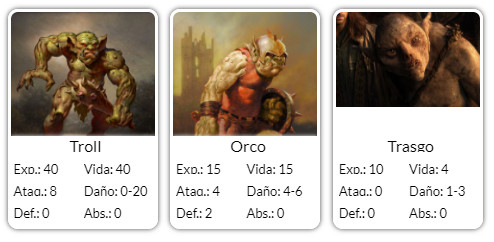
Monsters are the enemies that you will have to kill.
- Name
- Description
- Experience: when you kill a monster, you receive certain experience points.
- Life: the life a monster has
- Attack: the value that will be added to your attack roll
- Maximum damage: the maximum damage an enemy can do to you if his attack is successful
- Minimal damage: the minimum damage a player can do to you in case of a successful attack.
- Defense: defense bonus that has
- Absorción: Puntos de vida que absorberá su armadura, en caso de que consigas realizar sobre él con éxito un ataque.
- Image: you can choose an avatar for your enemy
The fight
During the reading, the character may encounter enemies to eliminate. Then a fight begins. The character can face a single enemy or several at the same time. In general, the first one to attack is usually the character. But it can happen (the writer of the adventure has the option to change it) that the monsters have the initiative, and are therefore the first to attack. This will happen when the character is ambushed, falls into a trap, etc.
The character and the monsters have their properties of attack, defense, absorption, and points of life.
In each attack turn, the attacker and the defender will roll a die. The value showed will be added to the value of attack and defence . In case the attack value exceeds the defence value, the attacker will damage the opponent’s life points , and the damage will be equal to a random number between the minimum and maximum possible value that he can perform. The value resulted will be subtracted from the absorption value of the defender.
There are some modifiers that can be applied to both the character and the monsters. These modifiers can be decided by the writer of the adventure, or they can be the result of spells performed by the character or the monster.
They are the following:
- Penalty turns: during that number of turns, you can not attack. It could be because the creator of the adventure decided it or because of a spell.
- Modification in the attack: a spell can decrease or increase the attack of the performer of the spell.
- Modification in the defense: a spell can decrease or increase the attack of the performer of the spell.
- Magical Attack: A spell like water, fire, or electric beam can immediately damage an enemy
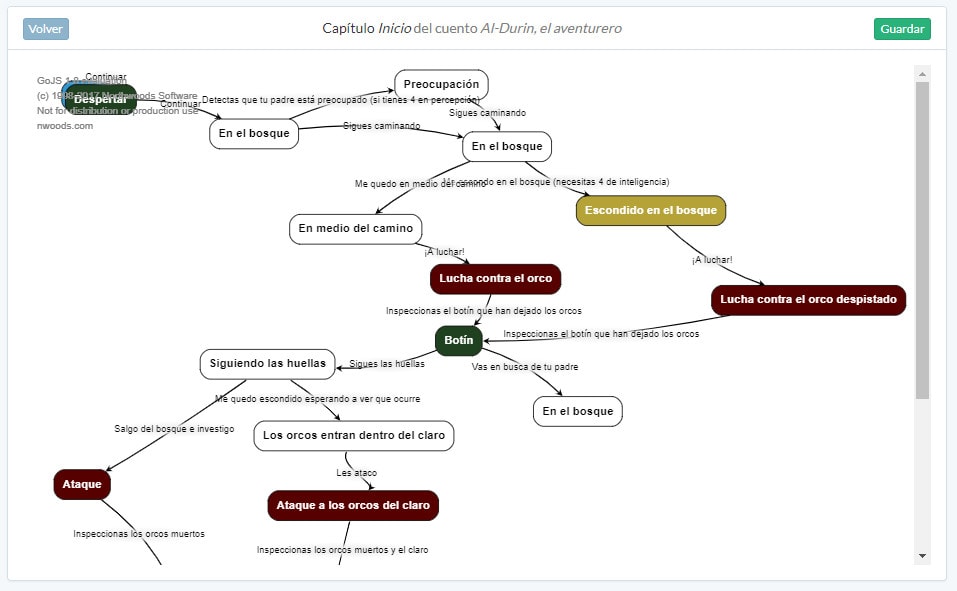
Once you know that you can create monsters, events, spells, and objects, you can start editing the adventure.
You will see that by double clicking on the nodes or links you will see new options.
Edition of the nodes (pages)
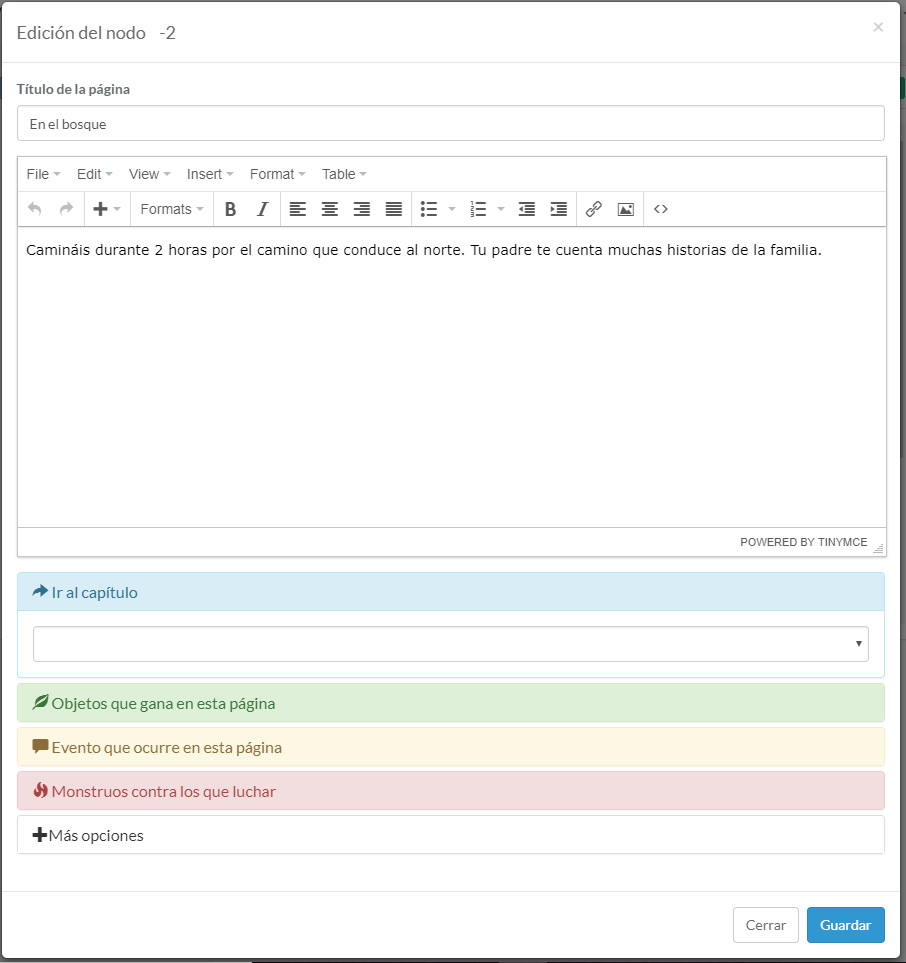
If you click on the node you will see that you have several new options:
Objects: if you want the character to win some object on this page.
Events: if you want an event to happen on this page.
Monsters: here you indicate the monsters that the character will fight against.
More options: here you have many more options:
Coins you earn: if on this page the character earns coins
Arrows you win: if on this page the character can obtain arrows
Experience you get: the number of experience points that the character will get.
Initiative enemies: If you selected any monsters for this page, if you click here, they will start attacking the enemies. It is very interesting to use this function depending on whether it is the enemies that surprise the character, or whether the character is the first one to attack.
Lost turns attack monsters: your character may be hiding and attack enemies by surprise. In that case, the enemies will have penalization turns.
Lost turns character attack: the same thing but the one that has a penalty is the character
Lost points of life: in the case that your character has fallen into a trap, directly loses points of life.
Points of life earned: maybe your character sleeps in an inn, and you want him to recover life points.
Editing the links (links to new pages)
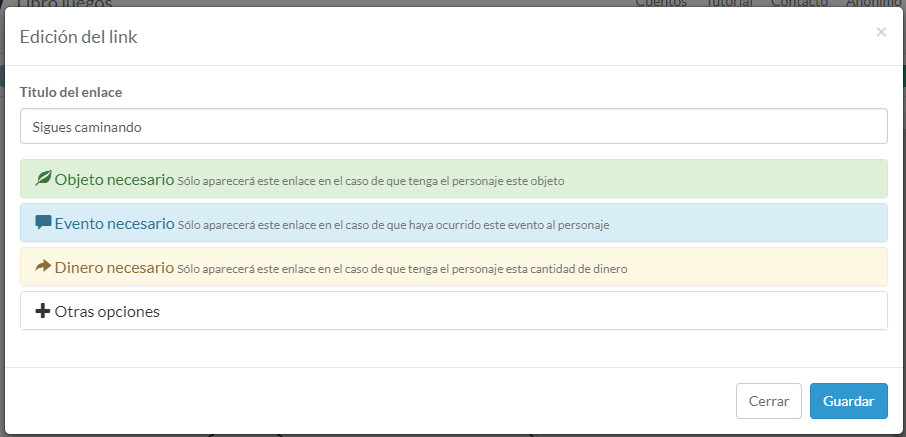
If you click on the link, you will see that you have several additional options:
Required object: you can not access the next page unless you have a specific object.
Required events: you cannot access the next page unless you have a specific event
Required money: maybe the character has to pay someone to get into a place. It should have a certain number of coins.
Other options that you can see:
Click here if you want the reader to be able to see this option although he shouldn’t (instead of a link, it will be a non-clickable text): If you want your reader to know that he / she was NOT able to go to a certain page ( due to, for example, a lack of money, or the lack of a specific level of perception, etc.), you can click this option. This way the reader will be aware of the fact that there was a reason why he was unable to access that option.
Minimum required intelligence: the character needs this level of intelligence to access the next page
Minimum perception required: the same as in Intelligence
Minimum necessary charisma: the same as in Intelligence